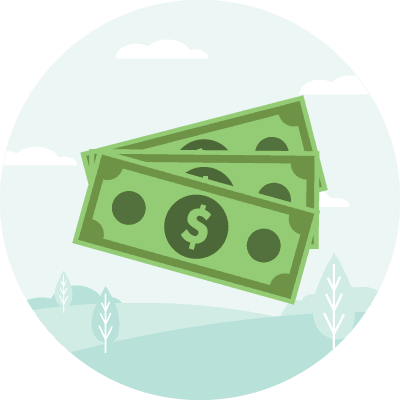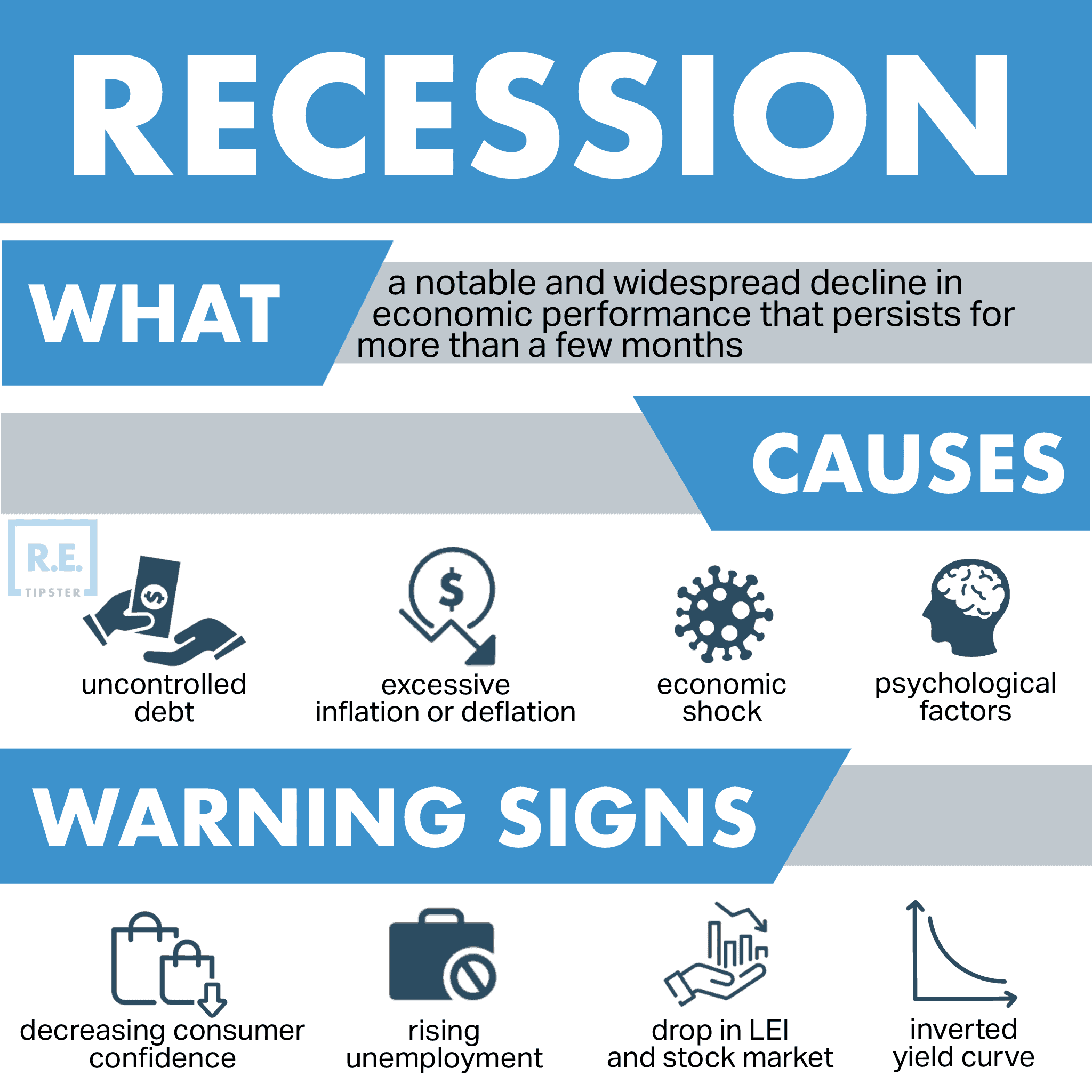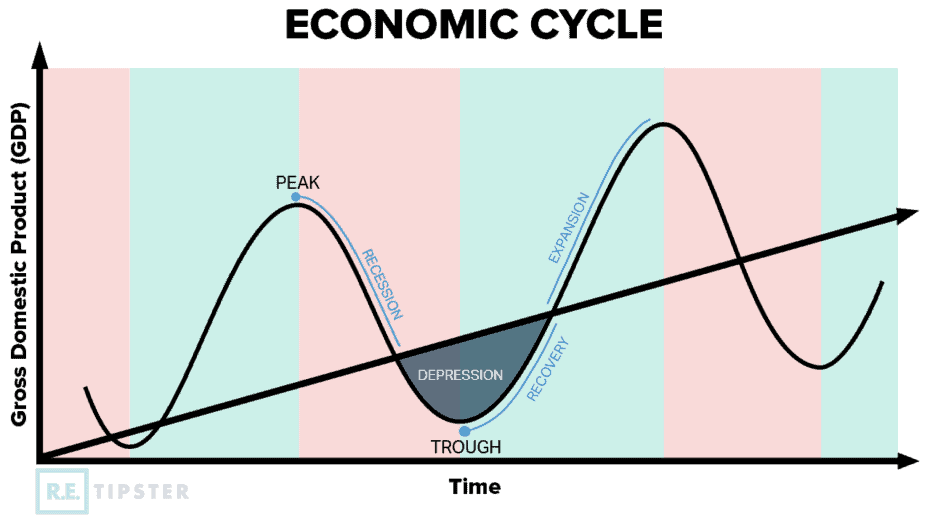what happens to long term interest rates when there is a recession
Recession Definition

What Is a Recession?
A recession is a notable and widespread pass up in economical performance that persists for more than a few months. It is mostly a time when the economy experiences at least two successive quarters of reduction in the gross domestic production (Gdp).
REtipster does non provide tax, investment, or financial advice. Always seek the help of a licensed financial professional before taking action.
What Happens During a Recession?
The National Bureau of Economic Research (NBER), a individual, non-profit arrangement that determines the showtime and end dates of U.S. recessions, offers a more flexible style to define recession-—"a pregnant decline in economic activity spread across the economic system, lasting more than a few months, ordinarily visible in real Gdp, real income, employment, industrial production, and wholesale-retail sales[1]."
During a recession, business owners often face a pass up in their sales, which could lead to layoffs and even a declaration of defalcation. As businesses struggle and fail, employers are forced to cut costs and lay off their employees, which leads to a rising in unemployment. Although some employees may be able to proceed their jobs, they may have to bargain with wage and benefit cuts, and negotiating salary increases may be a struggle. These circumstances may affect an individual'due south power to pay bills and settle debt, such as mortgage loans.
Recession and the Real Estate Market
The real estate industry typically suffers from a drop in property values during a recession, because when houses are listed for auction, they tend to stay on the market for a longer menstruation of fourth dimension before they sell.
When a recession causes rising unemployment and stagnant household incomes, banks and lending institutions get more than cautious and restrictive in the amounts of financing and loan approval standards. They may tighten their lending rules and criteria past requiring college minimum credit scores or a larger downwards payment. Additionally, paying off mortgages during a recession becomes even more challenging, which is why short sales and foreclosures usually increase during this fourth dimension.

Although these scenarios are generally bad news for real manor professionals and the industry, they can also create opportunities for buyers. Recessions tend to make the market less competitive since there are fewer investors and homebuyers who take the means to purchase real manor during an economical downturn. This means potential buyers will have time to look at other properties and will not be pressured to immediately pounce on their desired property for fear it volition be off the marketplace earlier they can submit an offer.
With fewer buyers in the market, a seller may be willing to accept offers below their asking cost or take the initiative to lower their selling price to make their properties more appealing. Along with falling firm prices[two], buyers tin can also take advantage of lower interest rates. During a recession, the Federal Reserve volition often lower the benchmark interest rates to encourage investments. Banks will, in plough, charge reduced interests on loans, including mortgages.
Recession vs. Depression
Many economists concur that an economic low and an economic recession have similar causes. However, a low results in a much more devastating economic affect than a recession[3]. Depressions cause far greater job losses and sharper GDP declines. It as well lasts much longer than a recession; for example, the Great Depression of the 1930s lasted ten years. More often than not, the amount of fourth dimension it takes for an economy to recover is a major differentiator between a recession from a depression.
Mutual Causes of Economic Recessions
Identifying the specific circumstances leading up to a period of recession is rarely black-and-white. Many factors may contribute to a cascade of business concern failures that will inevitably event in an economic downturn.

Some mutual causes are as follows:
- Uncontrolled debt. When businesses or individuals, in the public or private sector, take on excessive loans, the cost of servicing the debt tin can balloon to the point where the borrowers are unable to pay back their lenders. A large enough debt default tin can lead to a business declaring defalcation. Plenty defaulting borrowers can lead to a bank failure. Unhealthy lending institutions can lead to a tight money market, which can lead to sluggish economic growth, which can somewhen snowball into a recession. And when a recession happens, borrowing money and paying off debt becomes even much more than hard[4], which leads to a down spiral.
- Excessive aggrandizement or deflation. Inflation is when the prices of goods and services rise for a period, while deflation happens when there is a sustained fall of those prices. Although these conditions are nifty past themselves, excessive aggrandizement or deflation is dangerous and tin can potentially force an economy into recession. This is why central banks, such as the Federal Reserve, constantly monitor price changes. When aggrandizement gets out of manus, central banks may raise interest rates. Every bit interest rates rise, economic activities fall. On the other hand, central banks fight off excessive deflation by lowering bank reserve limits or target interest rates on short-term funds.
- Economic shock. Some other potential driver that can cause an economy to autumn into a period of recession is when an economic shock occurs. An economic daze is any significant change to economic variables or relationships that impacts a land'south economic operation. A recent example of this phenomenon is the COVID-19 pandemic—which stalled economies of most, if not all, countries effectually the world. Many countries had to declare lockdown protocols that harmed labor productivity and growth charge per unit, disrupting supply and need bondage in the earth'due south interconnected economy, leading to a iv.3% contraction of the global GDP in 2020[5].
- Psychological factors. Economists likewise often cite psychological factors as contributory to an economic system'due south downfall. Investors tin can be also optimistic when the economic system is strong. Their irrational and unrestrained exuberance can cause stock or existent estate markets to inflate upwardly to the extent it has to "pop" and many engage in panic selling, which can cause the markets to crash and lead to a recession.
How to Predict an Economic Recession
Information technology is difficult to know when and how a recession volition happen. Apart from the two uninterrupted quarters of Gdp reject, economists have to account for other factors to forecast if there is an impending recession or in that location is already one in place.
That said, the following are some usual indicators of potential problem brewing in the economy:
- Inverted yield curve. Yield refers to the interest rates on bonds or treasuries. These treasuries have varying duration or maturity—some may last a few months, while others last for years. The yield bend is a graphical representation of the interest rates on similar bonds beyond dissimilar maturities. A normal yield curve has an upward slope, indicating that short-term interest rates are lower than long-term rates. However, when the yield curve becomes inverted (showing a downwardly slope), this reflects that brusque-term involvement rates are higher than long-term ones. This is a rare scenario that is considered a predictor of impending economical recession in one to two years[six].
- Waning consumer confidence alphabetize. Consumer spending is a main driver of the economic system. A person's spending activities are directly related to how confident they feel most their income's stability and the overall state of the economic system. When surveys evidence declining consumer confidence, this may upshot in less spending that will wearisome down the economy.
- Significant and sudden drops in the stock marketplace. A large and unexpected turn down in stock markets tin signify a looming recession. Investors may sell some or all of their holdings in anticipation of an economical downturn.
- Increasing unemployment rates. People losing their jobs is another crimson flag that a recession is possible, even if the NBER has not officially alleged one notwithstanding.
- A decline in the Leading Economical Index® (LEI). The LEI, which is published monthly, measures leading economic indicators in a bid to forecast future economical trends. It looks at various factors, such equally durable appurtenances orders reports, manufacturing orders and jobs, unemployment claims, edifice permits, and new housing units, among others.
Recession and the Business concern Bike
A business cycle traces an economy'southward upward and downward movements. The typical business bicycle has four phases: expansion, top, contraction, and trough.
The expansion stage refers to a flow of economical growth, usually characterized past a rising in consumer demand and spending and an increase in employment rates. As these factors go up, the cost and product of appurtenances and services will likewise manifest an up motility.
The peak phase represents the highest bespeak of economic expansion. The terminal calendar month before primal economic indicators begin to drop often signifies the peak of a business concern bike.
The wrinkle phase is a period that shows a significant refuse in economic functioning, such as higher unemployment rates and Gdp downturn.
Finally, the trough stage is the lowest bespeak in a business bicycle where economical operation is at the bottom. The trough, notwithstanding, is also considered a turning point as information technology marks the end of declining economic activities and is succeeded by a new catamenia of expansion.

Recessions occur between the acme and trough phases. They are a regular occurrence in the ebb and flow of business cycles[7].
Takeaways
A recession is a fourth dimension when the economy'due south growth is stunted for a time due to diverse reasons, such every bit uncontrolled debt, excessive inflation and deflation, psychological factors, and economic shocks like the COVID-19 pandemic. Although it is difficult to decide when the economy will fall into a recession, there are usual indicators of an imminent economical downturn. An inverted yield bend, a drop in LEI, rise unemployment, and decreasing consumer conviction are reddish flags for a possible economical recession.
As recessions bring chore losses and unstable cash inflow, banks and lending institutions tighten lending criteria and become wary of approving loans, including mortgages. Equally a event, the real manor market will see reduced property values, houses for auction stay longer in the market, and difficulty settling mortgages, which are generally bad news for real manor professionals. That said, these scenarios can create opportunities for potential property buyers equally they tin have advantage of the lower overall housing prices and less competitive buying marketplace.
Bonus: Get a Gratuitous re-create of the INVESTOR HACKS ebook when yous subscribe!
Free Subscriber Toolbox
Want to larn about the tools I've used to make over $twoscore,000 per deal? Become immediate access to videos, guides, downloads, and more resources for existent estate investing domination. Sign up below for gratuitous and become access forever.
Source: https://retipster.com/terms/recession/
0 Response to "what happens to long term interest rates when there is a recession"
Post a Comment